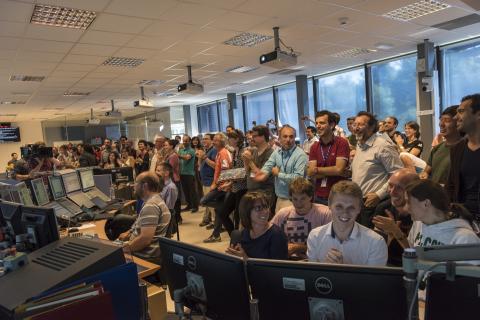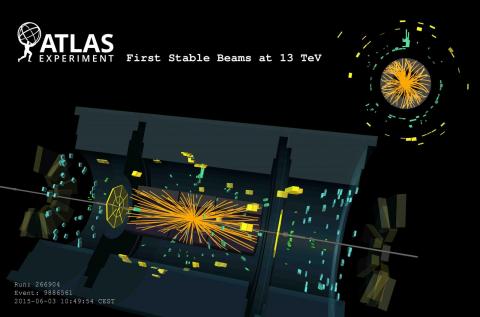

On June 3, 2015, CERN’s Large Hadron Collider (LHC) restarted its research program after a 27-month shutdown for upgrades by colliding its proton beams at a new world-record energy. The LHC is expected to run non-stop for the next three years, colliding particles at 13 TeV – almost double the collision energy of the last (then record) run. With the LHC starting again, physicists are one step closer to unravelling enduring mysteries of our universe, like the nature of dark matter.
“It is a great accomplishment and a rewarding moment for many people who have dedicated so much of their time to making this happen,” said CERN Director of Accelerators and Technology Frédérick Bordry.
During the LHC’s previous run at 8 TeV, the two general-purpose detectors (ATLAS and CMS) announced the (ultimately) Nobel prize-winning discovery of the missing piece of the Standard Model: the Higgs boson.
“The discovery of the Higgs boson was only the start of our journey. It is time for new physics!” said CERN Director General Rolf Heuer. “We have seen first data beginning to flow. Let’s see what they will reveal to us about how our universe works.”
For two decades TRIUMF has been integral to Canada's involvement in the ATLAS experiment. The hadronic calorimeters were built at TRIUMF, which also hosts an ATLAS Tier-1 computing centre for Canada. ATLAS Canada scientists also played leading roles in the search for the Higgs boson and for New Phenomena, like supersymmetry.
During the two-year hiatus, ATLAS underwent a significant update through the installation of an additional tracker layer and rigorous maintenance, including improvements to its electrical power, and cryogenic and cooling systems in preparation for the higher potential energy. TRIUMF is now building chambers for the muon spectrometer to be installed during the next long shutdown in three years
"The TRIUMF-ATLAS group is excited about the restart of the LHC at the higher centre of mass energy and looks forward to exploring the energy frontier. A discovery that could revolutionize our understanding of Nature may be hiding in the data," said TRIUMF Research Scientist Anadi Canepa, on behalf of the TRIUMF-ATLAS group.
ATLAS plans to develop precision measurements of the Higgs boson to further explore the Standard Model, and to explain remaining mysteries such as dark matter, and to potentially find evidence of supersymmetry. It will be many months before the first results will be forthcoming.
- prepared by Diyyinah Jamora, with content from InterActions press release
Images courtesy of CERN
